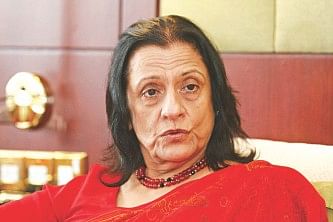Non-communicable diseases main challenge
Non-communicable diseases main challenge
WHO, South-East Asia regional director says about Bangladesh

Non-communicable diseases like diabetes, hypertension and cancer are the major health challenges faced by Bangladesh and many other developing nations of Asia, said a top official of the World Health Organization.
“This is a major problem because these diseases are taking so many young lives. People die of heart attacks very early,” said Dr Poonam Khetrapal Singh, regional director of WHO, South-East Asia region.
She lauded the service at community clinics that operate at the ward level in Bangladesh, saying that other countries of the region can learn from this.
Dr Singh made the remarks during an interview with selected media yesterday, ahead of a four-day regional conference beginning today at Sonargaon Hotel in the capital.
Health ministers, officials and experts of 11 countries -- Bangladesh, Bhutan, Korea, India, Indonesia, the Maldives, Myanmar, Nepal, Sri Lanka, Thailand and Timor-Leste -- are attending it.
Poonam Khetrapal Singh, who worked as a civil servant in India, and served in the World Bank and WHO headquarters before joining as WHO regional director this February, said although communicable diseases do not exist anymore in many parts of the western world, this region is still facing them.
Millions of people in the South-East Asian region are at risk from dengue, malaria, lymphatic filariasis and kala-azar, she said, adding that although countries in the region have controlled the spread of HIV/AIDS, tuberculosis and malaria, people are still dying of these diseases.
The main issue is that non-communicable diseases are causing 60 percent of the total deaths in the region, she said.
According to Bangladesh Demographic and Health Survey 2011, 53 percent of the population older than 35 years have high blood pressure in the country, while one third of the population are either diabetic or will get the disease in future.
Also, there are about 12 lakh cancer patients, and out of them 1.5 lakh people die of the disease annually. The disease attacks 2 lakh people yearly, she said.
“This is a rising trend… because of lifestyle. We have a sedentary lifestyle. Our eating habits have not improved. We eat things that are not healthy,” Dr Singh said, adding that tobacco use, high rate of air and water pollution in the region aggravate the situation.
These countries need to focus on non-communicable diseases, she said, but added that a shortage of funding is a drawback in dealing with these diseases.
Dr Singh said diseases like diabetes or hypertension require lifelong treatment, which is very expensive and therefore prevention is the solution.
“So, the governments should invest more money in fighting non-communicable diseases,” she said.
On community clinics, she noted her surprise in seeing communities' involvement in clinics that focus on maternal and child health.
“If there is a shortage of drugs, they do not wait for the government to replenish it unlike in many other countries in the region. The community gets together, buys the drug and gives it to the patients,” the regional director said.
Community Clinic (CC), one for every 6,000 people, is a ward-level public health facility. Nearly 11,000 community clinics were established during 1998-2001 to take healthcare to people's doorsteps.